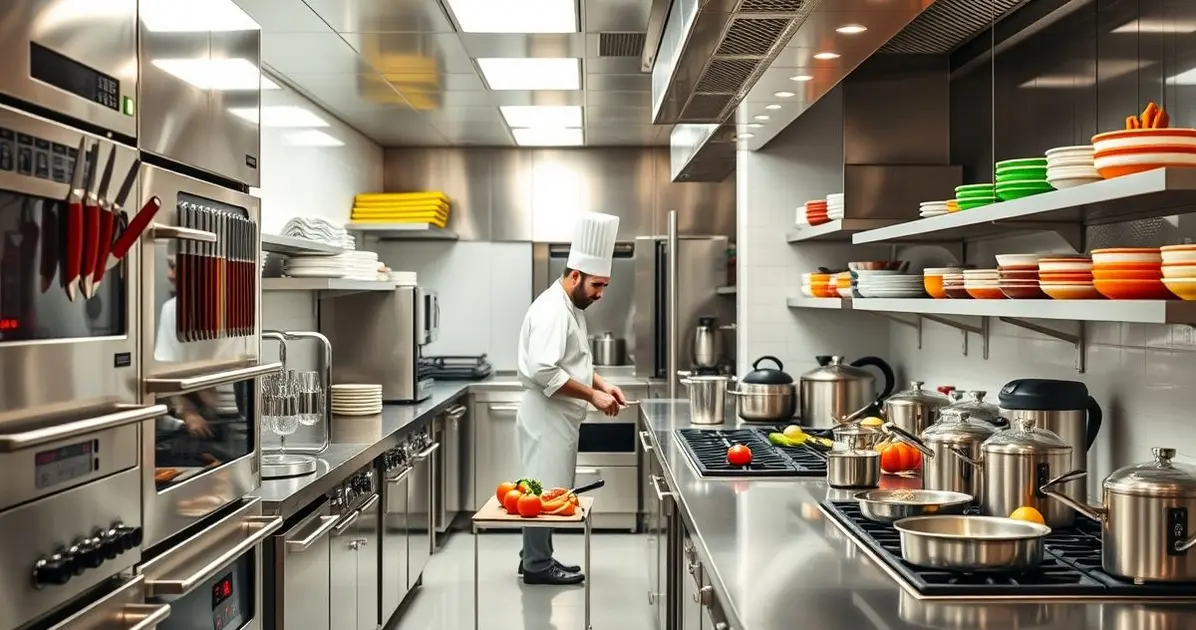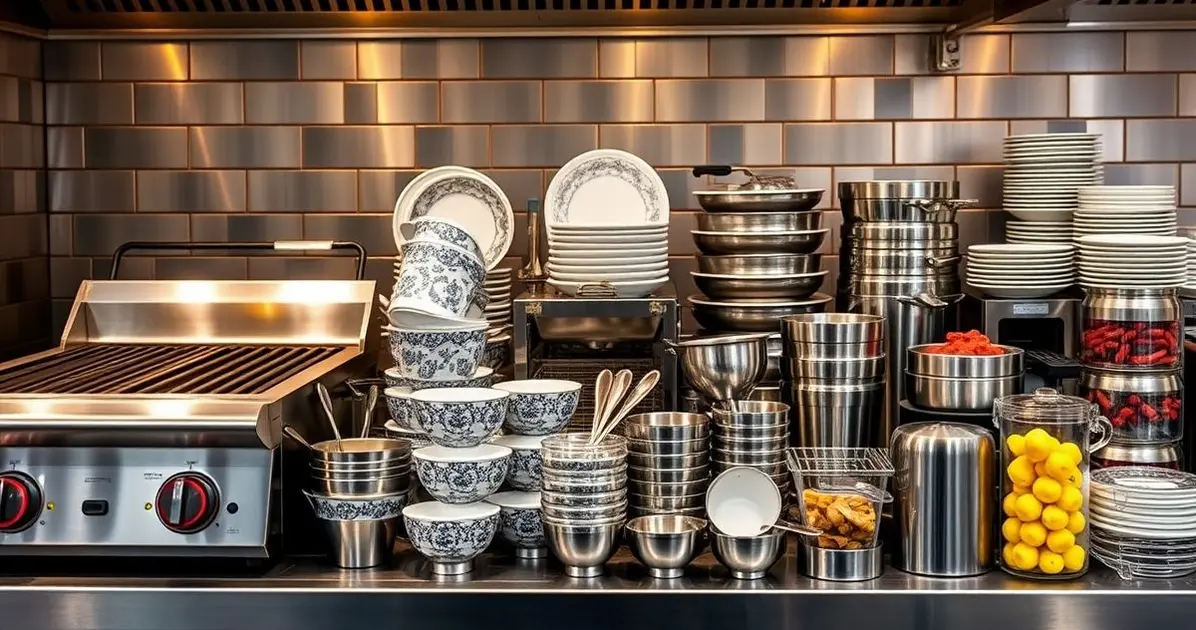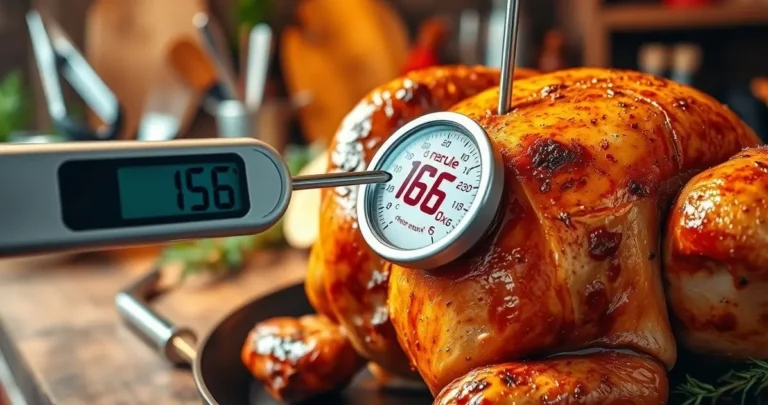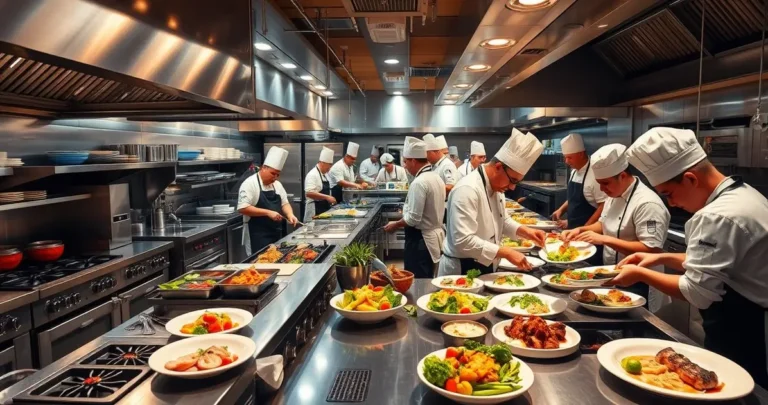In commercial cooking, a wide range of specialized tools and equipment are essential for efficiency and quality. From ovens to knives, these items play a crucial role in food preparation and service.
What are the tools and equipment in commercial cooking

Commercial cooking relies heavily on various tools and equipment to ensure high-quality meal preparation. Essential items include ovens, fryers, knives, and mixers, each serving a specific function in the kitchen.
Essential Cooking Appliances in Commercial Kitchens
Essential cooking appliances in commercial kitchens are critical for efficient food preparation and cooking. These appliances are designed to handle the demands of high-volume cooking and provide consistent results. Here’s a closer look at the key cooking appliances that every commercial kitchen should have:
1. Commercial Ranges: Ranges are the heart of any commercial kitchen, providing multiple burners and ovens for cooking:
- Gas Ranges: These ranges offer instant heat and precise temperature control, allowing chefs to cook multiple dishes simultaneously with ease.
- Electric Ranges: Electric ranges provide consistent heat and are often easier to clean, making them suitable for baking and simmering.
2. Ovens: Ovens are essential for baking, roasting, and broiling. Different types of ovens serve various purposes:
- Conventional Ovens: These ovens use heating elements at the top and bottom to provide consistent heat, making them versatile for a variety of cooking tasks.
- Convection Ovens: Equipped with a fan that circulates hot air, convection ovens cook food more evenly and can reduce cooking times.
- Combi Ovens: Combining steam and convection cooking, combi ovens are versatile and ideal for a variety of dishes, ensuring moist and flavorful results.
3. Deep Fryers: Deep fryers are crucial for frying foods quickly and consistently:
- High Capacity: Commercial deep fryers can handle large quantities of food, making them essential for busy kitchens.
- Temperature Control: Many deep fryers come with temperature controls to ensure that oil remains at the optimal frying temperature.
4. Griddles and Grills: Griddles and grills are ideal for cooking a variety of foods, providing unique flavors and textures:
- Flat Top Griddles: Perfect for cooking pancakes, burgers, and stir-fries, flat top griddles offer a large cooking surface for multiple items.
- Gas and Charcoal Grills: Ideal for outdoor cooking, these grills impart a smoky flavor to meats and vegetables.
5. Small Appliances: Small kitchen appliances enhance cooking efficiency and versatility:
- Food Processors: These versatile machines can chop, slice, and shred ingredients quickly, saving time in food preparation.
- Blenders: Essential for smoothies, sauces, and soups, blenders are versatile tools that can handle a variety of tasks.
In summary, essential cooking appliances in commercial kitchens include ranges, ovens, deep fryers, griddles, and small appliances. Each of these tools plays a vital role in ensuring efficient cooking processes and high-quality results. By equipping your kitchen with the right appliances, you can enhance your culinary skills and create exceptional dishes that satisfy your customers.
Importance of Quality Knives and Cookware
The importance of quality knives and cookware in the kitchen cannot be overstated. These fundamental tools are essential for achieving successful cooking results, ensuring safety, and enhancing the overall culinary experience. Here’s a closer look at why investing in quality knives and cookware is crucial:
1. Precision and Control: Quality knives are designed to provide precision and control when cutting, chopping, and slicing:
- Sharpness: High-quality knives maintain their sharpness longer, allowing for clean cuts and reducing the risk of accidents caused by dull blades.
- Ergonomic Design: Well-designed knives offer comfortable grips, which enhance control and reduce hand fatigue during extended use.
2. Durability: Investing in quality cookware and knives means choosing durable materials that can withstand the rigors of daily cooking:
- Long-Lasting Performance: Quality cookware made from materials like stainless steel, cast iron, and anodized aluminum is resistant to wear and tear, ensuring longevity.
- Cost-Effectiveness: While high-quality tools may have a higher upfront cost, their durability means they won’t need to be replaced frequently, saving money over time.
3. Enhanced Cooking Experience: Using quality knives and cookware can significantly improve your cooking experience:
- Efficient Cooking: Quality cookware heats evenly and retains heat well, allowing for better cooking control and more consistent results.
- Flavor Development: High-quality pans and pots enable techniques like searing and browning, which enhance the flavor profile of your dishes.
4. Safety Considerations: Safety is paramount in the kitchen, and quality knives and cookware contribute to a safer cooking environment:
- Reduced Risk of Injury: Sharp, well-maintained knives reduce the likelihood of slips and accidents, while durable cookware minimizes the risk of breaks or malfunctions.
- Stable Construction: Quality cookware is designed to be stable and secure, preventing spills and accidents during cooking.
5. Versatility in Cooking: Quality knives and cookware offer greater versatility, allowing you to explore a wider range of cooking techniques:
- Multi-Functional Tools: High-quality knives can handle various tasks, while versatile cookware can be used for frying, baking, sautéing, and more.
- Inspiration for Creativity: Having the right tools encourages experimentation and creativity in the kitchen, allowing you to try new recipes and techniques.
In summary, the importance of quality knives and cookware lies in their ability to enhance precision, durability, safety, and versatility in the kitchen. By investing in high-quality tools, you can improve your cooking experience and achieve exceptional results in your culinary endeavors, whether you are a novice cook or a seasoned chef.

Advanced Food Preparation Equipment
Advanced food preparation equipment is essential for enhancing efficiency and precision in the kitchen, especially in commercial settings where time and quality are crucial. These tools and appliances streamline food prep tasks, allowing chefs to focus on creativity and execution. Here’s a detailed look at some advanced food preparation equipment:
1. Food Processors: Food processors are versatile appliances that can perform a variety of tasks quickly:
- Chopping and Slicing: They can chop vegetables, slice fruits, and shred cheese in seconds, making them invaluable for meal prep.
- Dough Mixing: Food processors can also mix dough for bread and pastries, providing consistent results with minimal effort.
2. Immersion Blenders: Immersion blenders, or hand blenders, allow for quick blending directly in pots and bowls:
- Convenience: This tool eliminates the need to transfer hot liquids to a traditional blender, reducing mess and saving time.
- Versatility: Use it for pureeing soups, emulsifying dressings, and even whipping cream, making it a valuable addition to any kitchen.
3. Sous Vide Machines: Sous vide cooking involves vacuum-sealing food in a bag and cooking it in a water bath at precise temperatures:
- Precision Cooking: Sous vide machines ensure that food is cooked evenly and retains moisture, enhancing flavor and tenderness.
- Consistency: This method allows for precise control over cooking times and temperatures, resulting in consistent results every time.
4. Commercial Mixers: Stand mixers are essential for baking and can handle heavy mixtures:
- Versatility: Many mixers come with attachments for different tasks, such as kneading dough, whipping cream, and mixing batter.
- Time-Saving: Stand mixers save time and effort, allowing for hands-free mixing while you prepare other ingredients.
5. Mandoline Slicers: Mandoline slicers are specialized tools for achieving uniform slices of fruits and vegetables:
- Precision Slicing: These tools allow for precise and consistent slicing, which is especially useful for salads, garnishes, and gratins.
- Adjustable Thickness: Many mandolines come with adjustable settings for different thicknesses, providing versatility in food preparation.
6. Commercial Griddles and Grills: These appliances are ideal for cooking a variety of foods, providing unique flavors and textures:
- Flat Top Griddles: Perfect for cooking pancakes, burgers, and stir-fries, flat top griddles offer a large cooking surface for multiple items.
- Gas and Charcoal Grills: Ideal for outdoor cooking, these grills impart a smoky flavor to meats and vegetables.
In summary, advanced food preparation equipment, including food processors, immersion blenders, sous vide machines, commercial mixers, mandoline slicers, and griddles, enhances efficiency and precision in the kitchen. By incorporating these tools into your cooking routine, you can streamline food preparation, improve the quality of your dishes, and inspire culinary creativity. Embracing this equipment allows you to explore new techniques and elevate your cooking skills to new heights.
Selecting the Right Refrigeration Systems for Efficiency
Selecting the right refrigeration systems for efficiency is crucial in any kitchen, especially in commercial settings where food safety and preservation are paramount. The right refrigeration solutions help maintain the quality of ingredients while optimizing energy usage. Here’s a detailed look at how to choose the right refrigeration systems:
1. Types of Refrigeration Systems: Understanding the different types of refrigeration systems available is essential:
- Reach-In Refrigerators: These are commonly used in commercial kitchens for easy access to ingredients. They come in various sizes and configurations, making them versatile for different kitchen layouts.
- Walk-In Coolers: Ideal for larger establishments, walk-in coolers provide ample storage space for bulk ingredients and supplies, allowing for efficient organization.
- Freezers: Freezers are essential for storing perishable items long-term. Consider both upright and chest freezers based on space and accessibility needs.
2. Energy Efficiency: When selecting refrigeration systems, energy efficiency is a critical factor:
- Energy Star Rated: Look for units that are Energy Star certified, as these appliances meet strict energy efficiency guidelines, helping to reduce utility costs.
- Insulation Quality: High-quality insulation in refrigerators and freezers minimizes energy loss, ensuring that the units operate efficiently.
3. Size and Capacity: Choosing the right size and capacity for your refrigeration needs is essential:
- Assess Storage Needs: Evaluate your kitchen’s storage requirements based on the volume of ingredients you use. Ensure that the refrigeration system can accommodate your needs without being excessively large.
- Footprint Considerations: Consider the available space in your kitchen when selecting a refrigeration unit to ensure it fits comfortably without obstructing workflow.
4. Temperature Control and Monitoring: Effective temperature control is vital for food safety:
- Adjustable Thermostats: Choose refrigeration systems with adjustable thermostats to maintain optimal temperatures for different types of food.
- Temperature Monitoring Systems: Consider units with built-in temperature monitoring systems or alarms to alert you to any fluctuations that could compromise food safety.
5. Maintenance and Cleaning: Regular maintenance is essential for the longevity and efficiency of refrigeration systems:
- Regular Cleaning: Schedule regular cleaning of condenser coils and ensure that door seals are intact to maintain efficiency and prevent breakdowns.
- Professional Servicing: Consider having your refrigeration systems serviced by professionals periodically to ensure they are operating at peak efficiency.
In summary, selecting the right refrigeration systems for efficiency involves understanding the types of units available, prioritizing energy efficiency, assessing size and capacity, ensuring effective temperature control, and committing to regular maintenance. By making informed choices about your refrigeration solutions, you can enhance food safety, reduce energy costs, and improve the overall efficiency of your kitchen operations.
Conclusion
In conclusion, selecting the right refrigeration systems for efficiency is crucial for maintaining food safety and preserving the quality of ingredients in any kitchen, particularly in commercial settings.
By understanding the different types of refrigeration units available, such as reach-in refrigerators, walk-in coolers, and freezers, you can choose options that best fit your storage needs and kitchen layout.
Prioritizing energy efficiency through Energy Star-rated appliances and high-quality insulation can lead to significant cost savings over time.
Additionally, ensuring proper size and capacity tailored to your kitchen’s requirements will optimize workflow and prevent overcrowding.
Effective temperature control and monitoring are vital for food safety, making it essential to choose units with adjustable thermostats and built-in monitoring systems.
Regular maintenance and cleaning practices will prolong the lifespan of your refrigeration systems and ensure they operate at peak efficiency.
By following these guidelines, you can create a well-organized, efficient kitchen that supports your culinary endeavors while ensuring the safety and quality of the food you prepare.
Embracing the right refrigeration solutions will ultimately enhance your cooking experience and contribute to the success of your culinary operations.
FAQ – Frequently Asked Questions about Refrigeration Systems in Cooking
What types of refrigeration systems are commonly used in commercial kitchens?
Common types include reach-in refrigerators, walk-in coolers, and freezers, each serving specific storage needs.
How can I ensure my refrigeration system is energy efficient?
Look for Energy Star certified units, ensure high-quality insulation, and perform regular maintenance to minimize energy loss.
What factors should I consider when selecting the size of a refrigeration unit?
Assess your kitchen’s storage needs based on the volume of ingredients you use and ensure the unit fits comfortably within your available space.
Why is temperature control important in refrigeration systems?
Effective temperature control is vital for food safety, ensuring that perishable items are kept at safe temperatures to prevent spoilage.
How often should I clean my refrigeration units?
Regular cleaning should be scheduled at least every few months, with professional servicing recommended annually to ensure optimal performance.
What maintenance practices can help prolong the lifespan of my refrigeration systems?
Regularly clean condenser coils, check door seals, and schedule professional servicing to ensure that your units operate efficiently.
See more
Discover plenty of easy and delicious recipes you can make at home, from hearty dinners to indulgent desserts and wholesome breakfasts.




